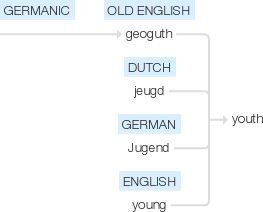Youth
Old English geoguth, of Germanic origin; related to Dutch jeugd, German Jugend, also to young.
wiktionary
From Middle English youthe, youhthe, ȝouthe, ȝewethe, ȝuȝethe, ȝeoȝuthe, from Old English ġeoguþ(“the state of being young; youth”), from West Germanic*juwunþa, from Proto-Germanic *jugunþō, *jugunþiz(“youth”), corresponding to young + -th. Cognate with Saterland Frisian Juugd, West Frisian jeugd, Dutch jeugd, German Low German Jöögd, German Jugend.
etymonline
youth (n.)
Old English geoguð "youth; young people, junior warriors; young of cattle," related to geong "young," from Proto-Germanic *jugunthi- (source also of Old Saxon juguth, Old Frisian jogethe, Middle Dutch joghet, Dutch jeugd, Old High German jugund, German Jugend, Gothic junda "youth"), from suffixed form of PIE root *yeu- "vital force, youthful vigor" (see young (adj.)) + Proto-Germanic abstract noun suffix *-itho (see -th (2)).
According to OED, the Proto-Germanic form apparently was altered from *juwunthiz by influence of its contrast, *dugunthiz "ability" (source of Old English duguð). In Middle English, the medial -g- became a yogh, which then disappeared.
They said that age was truth, and that the young
Marred with wild hopes the peace of slavery
[Shelley]
